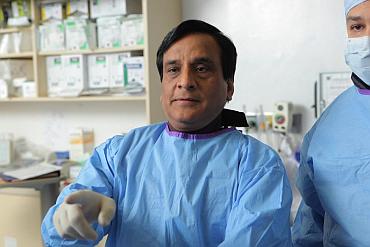 | « Back to article | Print this article |
 The New Jersey-based Mount Sinai Medical Center's Cardiac Catheterisation Laboratory and its director Dr Samin Sharma have yet again achieved the highest safety among New York state institutions that perform angioplasty or Percutaneous Coronary Intervention, and did so in every category measured.
The New Jersey-based Mount Sinai Medical Center's Cardiac Catheterisation Laboratory and its director Dr Samin Sharma have yet again achieved the highest safety among New York state institutions that perform angioplasty or Percutaneous Coronary Intervention, and did so in every category measured. 
No other center has achieved this level of safety rating--for both emergency and non-emergency cases--since public reporting of PCI results began in 1994. The data, compiled by the state, examined patient-discharges from 2006 to 2008, and compared 30-day risk-adjusted mortality rates among 54 institutions.
Sharma was the only physician in the state awarded a two-star safety rating for both emergency and non-emergency cases, indicating he has significantly below-average mortality ratings among doctors performing PCI in all cases.
'Mount Sinai's Cardiac Catheterization Lab achieved these exceptional ratings while performing the highest number of PCI procedures in the state,' said Wayne Keathley, president and chief operating officer, Mount Sinai Hospital.
The hospital performed 4,577 procedures in 2008, and 13,742 from 2006 to 2008. Overall, the cath lab performed about 32 percent more procedures during the three-year period than the hospital with the second-highest volume: 9,289 cases.
"Our results can be attributed to continuous improvement achieved by reviewing past cases, incorporating data from those past cases into our lab's rigorous medical protocol, and then communicating that protocol clearly and effectively to every member of our medical team," Sharma said.
To obtain the highest two-star rating, where data are risk-adjusted to account for levels of difficulty in treating each patient, a cardiac center has to accept the most challenging cases, and complete them with virtually no complications. A senior doctor is always present in the cath lab when it is open (six days a week from 6 am to midnight), to help junior doctors when required. This creates a sense of teamwork, said Dr Annapoorna Kini, associate director, cardiac cath lab.
"My goal is to make Mount Sinai Cath Lab the number one in the world. We are almost there, if not there already," Sharma said.
His lab treats more South Asians than any hospital in the state. Indians make up 18 percent of the patients at Mount Sinai, partly because the number of heart patients among South Asians is growing. The lab also employs several South Asian doctors.
Sharma cited the most important reasons for heart problems among South Asians: Lack of exercise, sedentary lifestyle, obesity and diabetes. Half of the heart patients have diabetes. South Asians also tend to have smaller arteries than people of other communities, and arteries tend to calcify earlier in them--at around age 40 to 50, rather than the 70 to 80 for the average American.
Treatment at the hospital is expensive though it does not turn away any patient who cannot pay, Sharma said.
Though city hospitals in general have been steadily losing patients to hospitals in the suburbs that have started cath labs, Mount Sinai remains an exception.
Jaipur-born Sharma came to the US in 1983 and joined Mount Sinai in 1990. Under his leadership a hospital named Eternal Heart Care Center was set up in Jaipur. It provides services similar to those available in New York.
Image: Dr Shamin Sharma